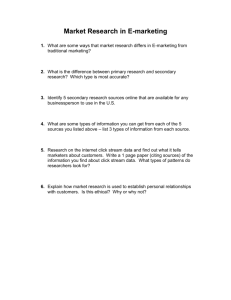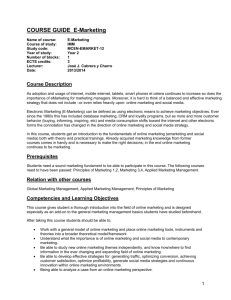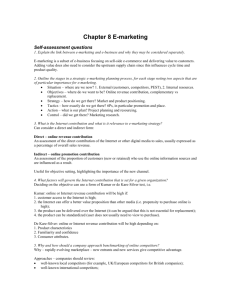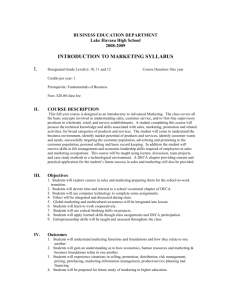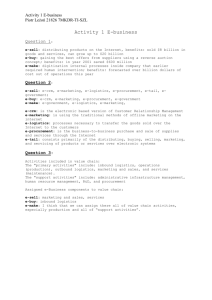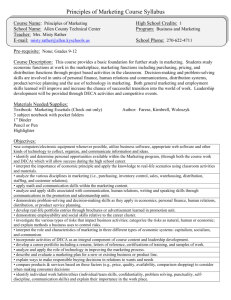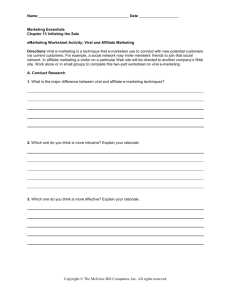CCA Mar217 Ecommerce Syllabus 2014-2015
advertisement
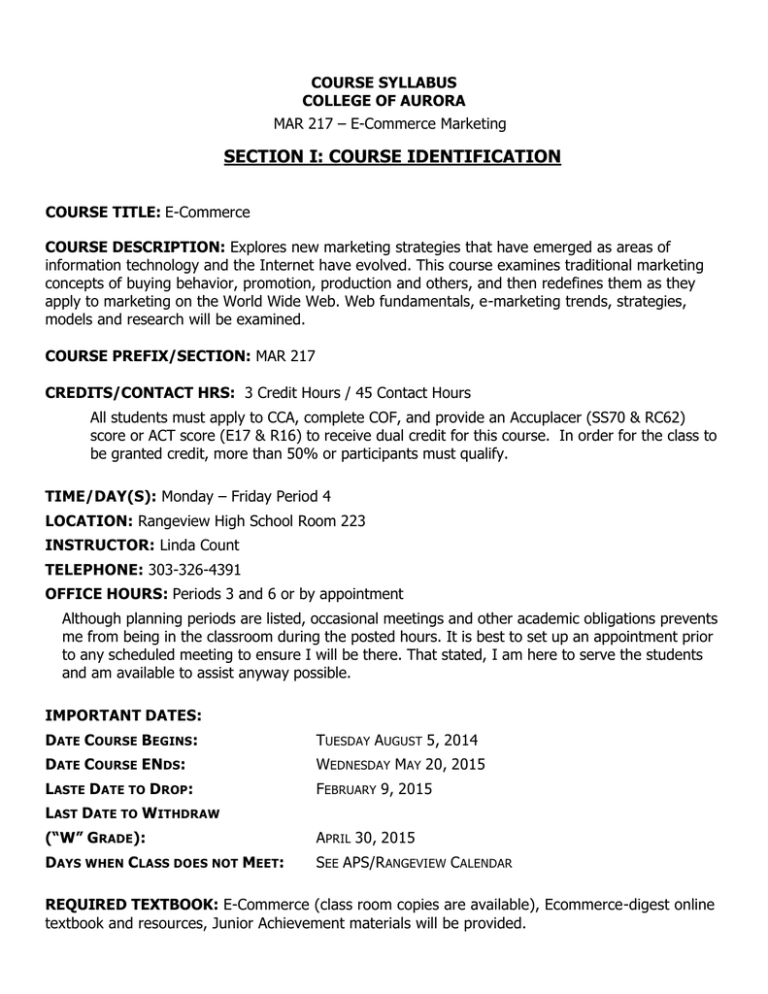
COURSE SYLLABUS COLLEGE OF AURORA MAR 217 – E-Commerce Marketing SECTION I: COURSE IDENTIFICATION COURSE TITLE: E-Commerce COURSE DESCRIPTION: Explores new marketing strategies that have emerged as areas of information technology and the Internet have evolved. This course examines traditional marketing concepts of buying behavior, promotion, production and others, and then redefines them as they apply to marketing on the World Wide Web. Web fundamentals, e-marketing trends, strategies, models and research will be examined. COURSE PREFIX/SECTION: MAR 217 CREDITS/CONTACT HRS: 3 Credit Hours / 45 Contact Hours All students must apply to CCA, complete COF, and provide an Accuplacer (SS70 & RC62) score or ACT score (E17 & R16) to receive dual credit for this course. In order for the class to be granted credit, more than 50% or participants must qualify. TIME/DAY(S): Monday – Friday Period 4 LOCATION: Rangeview High School Room 223 INSTRUCTOR: Linda Count TELEPHONE: 303-326-4391 OFFICE HOURS: Periods 3 and 6 or by appointment Although planning periods are listed, occasional meetings and other academic obligations prevents me from being in the classroom during the posted hours. It is best to set up an appointment prior to any scheduled meeting to ensure I will be there. That stated, I am here to serve the students and am available to assist anyway possible. IMPORTANT DATES: DATE COURSE BEGINS : TUESDAY AUGUST 5, 2014 DATE COURSE ENDS: WEDNESDAY MAY 20, 2015 LASTE D ATE TO DROP: FEBRUARY 9, 2015 LAST DATE TO W ITHDRAW (“W” GRADE): APRIL 30, 2015 DAYS WHEN CLASS DOES NOT MEET: SEE APS/R ANGEVIEW CALENDAR REQUIRED TEXTBOOK: E-Commerce (class room copies are available), Ecommerce-digest online textbook and resources, Junior Achievement materials will be provided. OTHER: CCA will provide accommodations for qualified students with disabilities. To request an accommodation, contact the Accessibility Services Office (ASO) Coordinator, Reniece Jones, at your earliest convenience. The ASO is located in the Learning Resource Center (LRC) in the Student Centre building on the CentreTech campus. Arrangements may also be made at the Lowry Campus. You may contact Reniece at (303)361-7395 V/TDD, or e-mail: Reniece.Jones@ccaurora.edu. RHS Student Handbook and Classroom Policies: Attendance: Attendance will be taken. Attendance is very important in this class. A natural consequence of excessive absences is decreased learning and achievement. It is the student’s responsibility to complete the missed work within 48 hours of returning to class. Conduct: Respect yourself, others, the teacher and the classroom. Attend class on a regular basis, be responsible for the classwork, participate in class constructively, and follow all classroom procedures as well as school guidelines. NO Food or drink allowed in classroom, No Phones or music without permission, and remember the computers are not a docking station or charging station. Headphones should not be worn upon entering class. Academic Honesty: As both a CCA and RHS student, you are expected to act and learn to the best of your ability every day. That means that all work you do must be your own. Academic honesty includes cheating, plagiarism, making up information, or enabling other people to cheat based on your work; this WILL lead to negative consequences. Take pride in your intelligence and abilities by doing your own work and encouraging others around you to do the same. Emergency Procedures: The Fire exits and emergency procedures will be discussed during the first class. When the fire alarm sounds, all students are expected to exit the building immediately. Since the security of items left behind is not guaranteed, students should gather all personal belongings before proceeding to the nearest exit. Bullying: Definition: Any written, verbal or pictorial expression, physical or electronic act or gesture, or a pattern thereof by a student that is intended to coerce, intimidate or cause any physical, mental, or emotional harm to any student. This includes the creation of an intimidating, hostile, or significantly offensive environment that interferes with the learning or performance of school-sanctioned activities of any student. Examples of Bullying: - Derogatory written or pictorial communications in any media (e.g., letters, notes, cellphones, social networks, voice mail, text messages, pager messages, newspaper articles, invitations, posters, photos, cartoons); - Derogatory verbal comments (e.g., name-calling, taunting, hostile teasing, spreading rumors, epithets, jokes or slurs); - Threats of force or violence against a person’s body, possessions or residence (e.g., obtaining food or money by threats of force); or - Physical conduct (e.g., provocative gestures, overly rough horseplay, restricting freedom of action or movement, violence, defacing or destruction of property). Any student engaged in bullying will face disciplinary action. All concerns of threats or rumors must be reported to a staff member as soon as possible. Cyberbullying Definition: Being cruel to others by sending or posting harmful material using the Internet, cell phone, or any social media. Spreading or forwarding rumors or threats or photos via social media is a serious offense. Any student engaged in cyberbullying will face disciplinary action. All concerns of threats or rumors must be reported to a staff member as soon as possible. Cyberbullying is a criminal offense and police will be notified. DECA CHAPTER: A class requirement, is taking an active role in the DECA chapter at Rangeview High School. This will require all class members to become National and State DECA members who must participate in chapter activities: community service projects, district competitions, fundraising, banquets, leadership activities and chapter meetings. Many of the activities will take place during the class meeting time, but additional functions will be required. Chapter dues of $30.00 will be required by September 1st payable to RHS DECA and given to the bookkeeper. Future DECA activities will also require the chapter member to wear appropriate business attire. (If you have concerns on the DECA requirement, please see me individually). SECTION II: COURSE OUTLINE AND STUDENT OUTCOMES INSTRUCTIONAL GOALS: The Instructional Unit has identified the following lifelong/workplace skills that are the foundation for your course of study at CCA: Communication, Critical Inquiry, Intra/Interpersonal Responsibility, Quantitative Reasoning, Technology, and Aesthetic Perception. Of these skills, this course will focus on: Communication, Critical Inquiry. GENERAL LEARNING OUTCOMES OF THE COMMUNITY COLLEGE OF AURORA: Successful students will have shown through in-class exercises and specific course assignments the ability to pursue and retain knowledge, comprehend the various significant levels of acquired knowledge (analyzing and identifying their various components), evaluate the significance of the knowledge, synthesize ideas from multiple sources, and apply what is learned to work and life situations. SPECIFIC COURSE OUTCOMES: The student will be given the opportunity to: I. Understand E-Marketing in the context of and as it relates to E-Business and E-Commerce. II. Describe trends in E-Business and e-Marketing, specifically. III. Explain the ways in which technology and the Internet have caused changes in Marketing. IV. Discuss the key principles of Marketing and how they have been adapted and applied in the context of E-Business, particularly Marketing Information, Consumer Behavior, Market Segmentation and the Marketing Mix. V. Explain the different technologies involved and how to leverage technology to maximize marketing effectiveness. VI. Discuss the importance of measurement in E-Marketing and examine the tools and tactics available to assist in measurement of marketing effectiveness. VII. Explain the ethical and legal considerations in the E-Marketing environment. COURSE OUTLINE I. Defining E-Business II. Background and History III. New Rules for E-Marketing IV. Consumer Behavior in E-Marketing V. E-Marketing Information Systems VI. E-Marketing Mix VII. Leveraging Technology VIII. Implementing E-Marketing in an Organization IX. Measurement of E-Marketing Efforts X. Ethics and Law SECTION III: EVALUATION PROCEDURES OVERALL STRATEGIES: Timely completion of assignments, prompt attendance, participation in class activities and discussions, and the tested ability to apply learned knowledge to common-life experiences will weigh toward the grade GRADING / EVALUATION: This class will have a mixture of weekly/short-termed assignments and long term projects. Organization skills are very important to the student success in this class. The student will be required to set goals and do what is necessary to accomplish these goals. A. Each student's grade will be determined from the following scale: CCA Points 100-93 CCA Grade A RHS SBG Translation ADV 92-82 B P 81-71 C P- 70-60 D PP Below 60 F U B. Grades will be earned from the following sources: Formative Assessments: Daily Classwork 10% Homework 10% Topic Quizzes 15% DECA related activities 15% Summative Assessments Presentations 10% Unit Exams 20% Essays/Projects 20% Marks and Grades: Marks indicate levels of proficiency on individual assessments and are recorded in the teacher grade book. Capital letters indicate summative assessments. Lower case letters indicate formative assessments. Grade book marks are converted to a single letter grade for eligibility and quarterly reports, and are recorded on an official student transcript. Body of Evidence: There are two types of assessment, formative and summative. Formative (assessments for learning) provide direction for improvement for the student and adjustment of instruction for the teacher e.g. observation, quizzes, homework, discussion, drafts, etc. These assessments are identified by lower case letters in the teacher grade book. Summative (assessment of learning) provide information to be used in making judgments about a student’s achievement at the end of a sequence of instruction, e.g. final drafts, tests, assignments, projects, performances, etc. These assessments are identified by capital letters in the teacher grade book. SECTION IV: TENTATIVE COURSE SCHEDULE A. Assignments: The planned schedule for readings, examinations and projects is contained in Section IV of the syllabus. B. Reading Assignments: The assigned reading in Section IV is to be accomplished during the week identified in the schedule. C. The Instructor reserves the right to change the daily teaching schedule to facilitate learning, understanding, and critical thinking. Assignment Due dates and the testing schedule may change with as much advance notice as possible. Students will be required to fulfill all assignments as outlined unless otherwise notified. Instructor reserves the right to change the daily teaching schedule and assignments to facilitate learning, understanding, and critical thinking. These dates are tentative. This class consists of four quarters, and listed below are the weeks, readings and assignments and due dates. Quarter Topic Assignment 1 Defining E-Business and Introduction to Entrepreneurship and what makes an organization Social Enterprise? Online module, case study, sloppy copy of business plan section I, research companies and elements of successful startups 1 Background and History of ECommerce, Strengths of building a good team and What’s my Business? Online modules, case study analysis, sloppy copy of business plan section II, market research assignment 2 New Rules for E-Marketing, needs assessments and Who’s My Customer? Online modules, case study analysis, sloppy copy of business plan part III, mystery shopper experience 2 Consumer Behavior in Emarketing, Empathy and What’s my Advantage? Online modules, case study analysis, sloppy copy of business plan section IV, competitive advantages exercise 2 E-Marketing Information Systems and Competitive Advantage Online modules, case study analysis, sloppy copy business plan section V, implement online marketing strategies 3 Ethics and Law; Ethics are good for Business! Online modules, case study analysis, sloppy copy business plan section VI 3 Leveraging Technology and Intentional Growth Online modules, case study analysis, sloppy copy business plan section VII, evaluate the technology used to support our online BIZ 3 Implementing E-Marketing in an organization and Continuous, Rapid Innovation Online modules, case study analysis, sloppy copy business plan section VIII, Develop an EMarketing plan for promoting online BIZ 4 Measurement of E-Marketing Efforts and Promoting Commitment and Performance. Online modules, case study analysis, sloppy copy of business plan COMPLETE, Analyze efforts and success of online BIZ 4 Formal Business Plan Using Sloppy Copy create a formal business plan Individual plans Class online BIZ Social Enterprise ------------------------------------------------------------------------------------------------------------------------------------I acknowledge that my child has explained the class requirements and we understand the policies. _____________ _________________________________________ Today’s date Class period _____________________________ ______________________________________ Student’s signature ________________________________________ Please print student’s name __________________________________________ Student Cell Student Email ________________________________________ (mother’s) Business telephone _________________________________ Please print mother’s name ________________________________________ (father’s)____________________________________ Business telephone ______________________________ Home telephone Please print father’s name _____________________________________ Parent signature _____________________________________________________________________________________ Parent’s email address Please take a check or cash for DECA dues of $30 to the bookkeeper and two receipts will be issued upon payment! One is for the student and one is for Mrs. Count. All DECA dues are payable on or before August 29th. This DECA fee will cover National and State dues as well as a chapter t-shirt.
